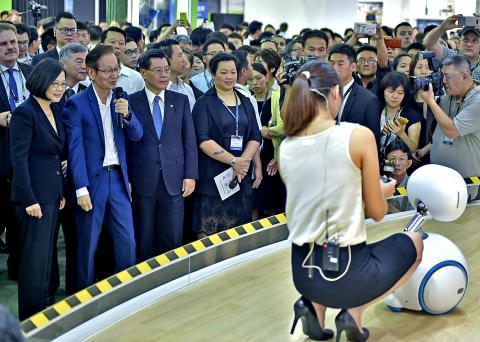The long-term care industry and virtual reality (VR) applications for the entertainment industry are among the key sectors being targeted by Acer Inc (宏碁) as the PC brand continues its business transformation.
“The direction of corporate transformation has become clearer in that we are going to enter the long-term care and VR industries,” Acer chief executive Jason Chen (陳俊聖) told President Tsai Ing-wen (蔡英文) yesterday in a briefing after the opening ceremony of the Computex Taipei at Taipei’s Nangang Exhibition Hall.
Acer has been investing in some new areas as the company is looking for long-term business opportunities rather than one-time hardware sales. In March, it acquired a 48.98 percent stake in US tablet maker grandPad Inc for US$11.04 million, aiming to provide solutions specifically designed for senior citizens.

Photo: Sam Yeh, AFP
Chen said the company in April also inked a strategic alliance with US-based Comfort Keepers, which is a leading provider of in-home care for senior citizens and adults who need help performing daily activities.
Together with Comfort Keepers and grandPad, Acer aims to expand its reach in the long-term care industry in the US, Chen said, adding that the company would invest more money in the long-term care sector.
In an effort to tap the VR entertainment industry, Acer is to form a joint venture with Stockholm-based game developer Starbreeze Studios and cooperate with movie company IMAX Corp to provide location-based entertainment, Chen said.
However, he declined to comment on the performance of the PC business, saying only that “it is challenging for worldwide PC companies, but our business has stabilized.”
Meanwhile, Asustek Computer Inc (華碩) chairman Jonney Shih (施崇棠) yesterday demonstrated the company’s first domestic robot, Zenbo, to Tsai at the company’s booth at Computex Taipei.
The voice-controlled Zenbo is an affordable US$599 and is equipped with many functions that make it a “smart home manager,” Shih said.
Zenbo can sense if senior citizens need medical help and make emergency calls for them, Shih said.
During the demonstration, Tsai activated Zenbo and successfully asked it to play music for her.

Sweeping policy changes under US Secretary of Health and Human Services Robert F. Kennedy Jr are having a chilling effect on vaccine makers as anti-vaccine rhetoric has turned into concrete changes in inoculation schedules and recommendations, investors and executives said. The administration of US President Donald Trump has in the past year upended vaccine recommendations, with the country last month ending its longstanding guidance that all children receive inoculations against flu, hepatitis A and other diseases. The unprecedented changes have led to diminished vaccine usage, hurt the investment case for some biotechs, and created a drag that would likely dent revenues and

Macronix International Co (旺宏), the world’s biggest NOR flash memory supplier, yesterday said it would spend NT$22 billion (US$699.1 million) on capacity expansion this year to increase its production of mid-to-low-density memory chips as the world’s major memorychip suppliers are phasing out the market. The company said its planned capital expenditures are about 11 times higher than the NT$1.8 billion it spent on new facilities and equipment last year. A majority of this year’s outlay would be allocated to step up capacity of multi-level cell (MLC) NAND flash memory chips, which are used in embedded multimedia cards (eMMC), a managed

CULPRITS: Factors that affected the slip included falling global crude oil prices, wait-and-see consumer attitudes due to US tariffs and a different Lunar New Year holiday schedule Taiwan’s retail sales ended a nine-year growth streak last year, slipping 0.2 percent from a year earlier as uncertainty over US tariff policies affected demand for durable goods, data released on Friday by the Ministry of Economic Affairs showed. Last year’s retail sales totaled NT$4.84 trillion (US$153.27 billion), down about NT$9.5 billion, or 0.2 percent, from 2024. Despite the decline, the figure was still the second-highest annual sales total on record. Ministry statistics department deputy head Chen Yu-fang (陳玉芳) said sales of cars, motorcycles and related products, which accounted for 17.4 percent of total retail rales last year, fell NT$68.1 billion, or

In the wake of strong global demand for AI applications, Taiwan’s export-oriented economy accelerated with the composite index of economic indicators flashing the first “red” light in December for one year, indicating the economy is in booming mode, the National Development Council (NDC) said yesterday. Moreover, the index of leading indicators, which gauges the potential state of the economy over the next six months, also moved higher in December amid growing optimism over the outlook, the NDC said. In December, the index of economic indicators rose one point from a month earlier to 38, at the lower end of the “red” light.